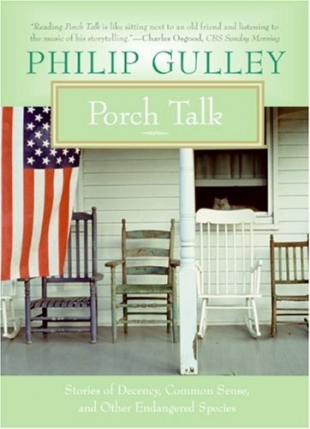" 'My greatest blessing,' my mother-in-law, Ruby Apple, tells me, 'is that I have always been content.'
"She tells me this often, so I know it must be true. She never says, 'My greatest blessing is that I have enjoyed good health,' or 'My greatest blessing is that I married well.' Though she appreciates her good health and marriage, she is most grateful for contentment, knowing it's a rarer bird.
"It's tempting to think there's a correlation between material abundance, ease of life, and contentment, but that's not the case with Ruby. She was born into a poor family and moved from home at the age of fifteen to work as a housekeeper and attend high school. She's lived in the same small house since 1941, raised five children, worked alongside her husband on a patch of Indiana ground, was widowed while the children were still home, and describes her life with words like 'fortunate' and 'happy.'
"Where I see hardship, difficulty, and suffering, she sees strokes of good luck and blessing. If I didn't know her better, I'd think she wasn't right in the head, but she's saner than anyone I've ever met.
"I've known Ruby twenty-five years. Once, during the early years of our association, I was seated at her kitchen table. Ruby was washing dishes, and I was reading a magazine article about happiness. It contained a quiz readers could take to gauge their well-being. I decided to test Ruby, so read her the questions, and marked her responses. According to the quiz, she was supposed to be miserable. The man who wrote the quiz was a doctor of psychology, so I know he must be right. I keep expecting Ruby to face reality and be depressed, but she stubbornly insists on being cheerful.
"I'm not the jealous type, but I envy Ruby her contentment. I'm always aiming for some elusive happiness and missing. Like most Americans, I'm guilty of thinking more stuff will make me happy, so I'm a vigorous gatherer of things that give me pleasure — chairs, books, and pocketknives. I'm most content when I'm sitting in a chair, reading a book, with a knife in my pocket. But the pleasure is fleeting. As soon as I get out of my chair, I'm prone to discontent.
"Every month or so, I drive the hundred miles south to Ruby's home and take her to lunch. She lives in a remote part of the state where the local restaurants are unremarkable, but to Ruby it's all white tablecloths, silver, and crystal.
"She orders the same thing no matter where we go — a chicken sandwich and 'a clear soda.' In all the years we've done this, she's never been displeased.
" 'How's your sandwich, Ruby?'
" 'Delicious.'
"On our way home, she talks about the sandwich and recounts her long history with chickens. 'We'd get two hundred baby chickens at Corydon every spring. Then along about September, we'd butcher most of them. Kept some of them back for laying hens, but we ate most of them. Howard, he'd work the chopping block, and me and the girls dipped 'em in the kettle, then plucked 'em.'
"It seems rather grisly to me, a fowlish holocaust, but Ruby smiles at the memory; her countenance is one of pure pleasure.
" 'Yes,' she says, on our ride home, 'chickens have been awful good to me.'
"I once asked Ruby the secret of her contentment, and she looked at me, thoroughly mystified. Secret? What secret? She smiled and went on about her day.
"Why are folks who think the least about contentment the most content?
"I suspect Ruby's 'secret' is low expectations. She grew up in hardship, assumed most of her life would follow that pattern, and so was surprised and grateful when good came her way. Too many of us approach life in the opposite manner. We believe the world owes us a great deal, are disappointed when it fails to deliver, and think ourselves deprived. If life were mashed potatoes, we'd see the lumps and Ruby would see the gravy.
"Perhaps our headlong pursuit of happiness is the enemy. Since Ruby never believed the world owed her happiness, she's found it in small ways, in the slightest things, cultivating the wise habit of seeing the silver lining and not the cloud.
"This is a great irony — people who have every reason to be content seldom are. Though happiness is their aim, it seems always out of reach. I wonder if gratefulness is the bridge from sorrow to joy, spanning the chasm of our anxious striving. Freed from the burden of unbridled desires, we can enjoy what we have, celebrate what we've attained, and appreciate the familiar. For if we can't be happy now, we'll likely not be happy when."
